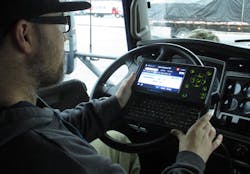Small-business truckers seek exemption from ELD mandate
The Owner-Operator Independent Drivers Association (OOIDA) has submitted an exemption request to a federal regulation requiring trucks to be equipped with electronic logging devices.
“Small-business truckers that have already proven their ability to operate safely should not be subject to purchasing costly, unproven and uncertified devices,” said Todd Spencer, executive vice president of OOIDA. “
The request was submitted to the Federal Motor Carriers Safety Administration (FMCSA) on Tuesday.
OOIDA has requested at least a 5-year exemption for motor carriers classified as small businesses, with a proven safety history with no attributable at-fault crashes, and who do not have a Carrier Safety Rating of “Unsatisfactory.”
Among the concerns cited in the request, the issue of self-certification of vendors is one of the biggest issues brought up by OOIDA. ELDs must be registered with FMCSA, which does not enforce any kind of validation process for product manufacturers.
“Most small-business motor carriers can ill afford to make these purchases only to learn later that the ELD is non-compliant. Yet they are required to do so or risk violation,” said Spencer.
Another concern expressed by OOIDA in the exemption request includes cybersecurity. FMCSA has urged vendors to build secure systems to accurately record hours of service, but ultimately, the burden of compliance will fall on the motor carrier.
OOIDA stressed that a five-year exemption would provide necessary time for ELD manufacturers to be fully vetted by the agency, which would alleviate small-business motor carriers from learning that they purchased a device that could damage their vehicles electronic control module or be hacked.
OOIDA is a member of a coalition of industry representatives that has spoken out against the mandate. OOIDA supports a bill proposed by U.S. Representative Brian Babin (R-TX) that would delay the ELD mandate for two years. Babin’s bill, H.R.3282, the ELD Extension Act of 2017, would extend the current implementation date from December 2017 to December 2019.
But for now, the mandate will take effect as scheduled, the FMCSA reiterated in a media briefing on Nov. 20. The Commercial Vehicle Safety Alliance announced several months ago that once the mandate is in force, commercial vehicles will not be placed out of service for not having an ELD (or device conforming to older automatic on-board recording device, AOBRD, standards) — at least not for a few months yet.
For commercial drivers required to be keeping track of their hours of service (HOS) and record of duty status, enforcement officers will be looking to see that drivers have proper logs and are in compliance with HOS requirements. From Dec. 18, 2017 through April 1, 2018, drivers who aren't using an ELD but have paper logs in order will receive a citation but won't be placed out of service.
